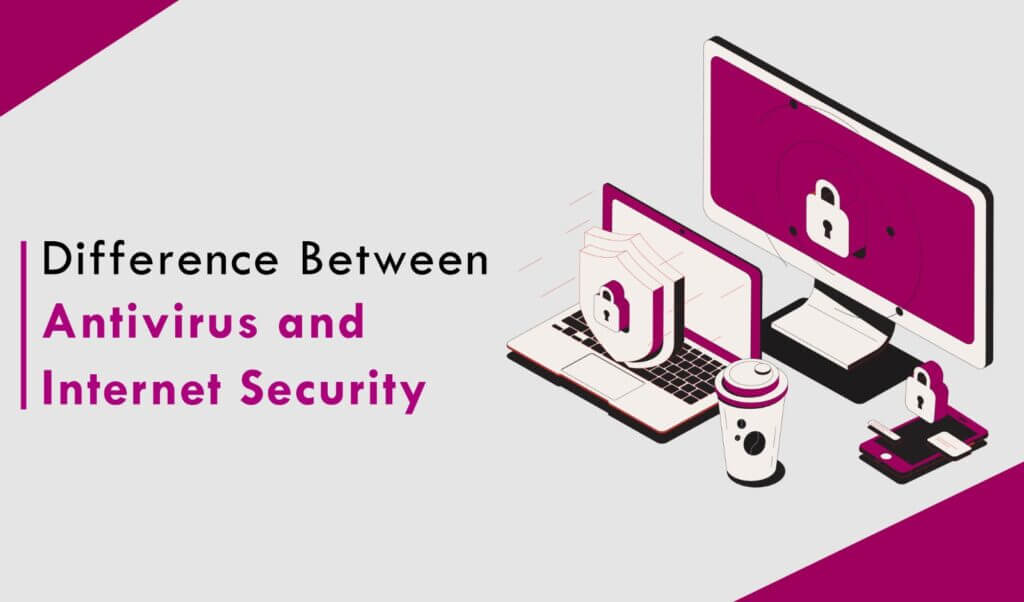In the digital age, protecting your personal information and devices from threats has become increasingly important. Two key types of protection available to users are antivirus and Internet security programs. Despite their common goal, there are significant differences between the two.
In this article, we will explore the fundamental differences between antivirus and Internet security programs, answering the questions “what is an antivirus?” and “what is Internet security?”
We will also provide a detailed antivirus and Internet security comparison to help you decide which type of protection is best for you!
What is an Antivirus?
Antivirus software are programs designed to detect, prevent, and remove malicious software (malware) from your computer system. Malware includes viruses, worms, Trojans, ransomware, spyware, adware, and other forms of harmful software that can compromise your system and data.
By installing antivirus software on your computer, you can significantly reduce the risk of falling victim to cyberattacks.
Key Features of Antivirus Software
- Virus detection and removal: antivirus programs use signature-based detection to identify known malware and heuristics to detect new or modified malware. Once detected, the software attempts to remove the threat from your system.
- Real-time scanning: this feature continually monitors your computer’s files, emails, and downloads to detect and block any potential malware threats.
- Scheduled scanning: antivirus software allows you to schedule periodic scans of your computer to ensure that no malware has infiltrated your system.
- Quarantine and removal: If malware is detected, antivirus software typically quarantines the infected files and removes them, either by deleting the file or repairing it.
What is Internet Security?
Internet security refers to a broader set of tools and technologies designed to protect not only against malware but also against other online threats and attacks, including phishing, spam, hackers, and privacy breaches.
Internet security suites typically include antivirus software as one of their core components, but also offer additional features and functionalities to provide a more comprehensive layer of protection.
Key Features of Internet Security Suites
- Firewall: a firewall is a crucial component of Internet security suites. It acts as a barrier between your computer and the Internet, monitoring incoming and outgoing traffic to block unauthorized access and prevent hacking attempts.
- Anti-phishing: phishing is a type of cyberattack where attackers attempt to trick users into revealing sensitive information, such as login credentials or credit card details. Internet security suites often include anti-phishing tools to detect and block phishing websites and emails.
- Anti-spam: this feature filters out unwanted and potentially dangerous emails, reducing the risk of phishing and other email-based threats.
- Parental controls: Internet security suites may include parental control tools that help parents monitor and manage their children’s online activities, such as blocking access to inappropriate websites and setting time limits for Internet use.
- Privacy protection: Internet security programs often include privacy protection features, such as virtual private networks (VPNs), which encrypt your online data and hide your IP address, making it more difficult for hackers and other third parties to track your online activities.
- Secure browsing: this feature scans websites for potential threats and warns you if a site is unsafe or contains malicious content.
Antivirus and Internet Security Comparison
Now that you know the difference between antivirus and Internet security programs, let’s compare their main features and benefits.
Antivirus Software
- Focused on malware protection: antivirus software specializes in detecting, preventing, and removing malware from your devices.
- Lightweight and less resource-intensive: due to its narrower scope of protection, antivirus software typically consumes fewer system resources, making it a great option for older or slower devices.
- Lower cost: antivirus programs tend to be more affordable than Internet security suites, making them an attractive option for users on a budget.
- Compatibility: standalone antivirus software is usually compatible with other security tools, allowing users to mix and match their preferred protection solutions.
Internet Security Suites
- Comprehensive protection: Internet security suites offer a broader range of features, providing protection against not only malware but also various online threats, such as phishing, spam, and hacking.
- Unified solution: by combining multiple security tools in a single package, Internet security suites offer a streamlined and convenient solution for users who want an all-in-one approach to online protection.
- Enhanced privacy: with features such as VPNs and privacy protection tools, Internet security suites help safeguard your online privacy and keep your data secure from prying eyes.
- Parental controls: for families with young children, the inclusion of parental controls in Internet security suites is a valuable asset, helping parents maintain a safe online environment for their kids.
Which One is Right for You?
Deciding between antivirus and Internet security programs depends on your specific needs and priorities.
If you are primarily concerned with malware protection and have a limited budget, a standalone antivirus program may be sufficient. Antivirus software will keep viruses, Trojans, and other similar malicious programs from sneaking onto your computer and other devices.
However, if you are looking for more comprehensive protection against a variety of online threats and require additional privacy and parental control features, an Internet security suite may be a better choice.
Antivirus Software vs. Internet Security: The Bottom Line
Understanding the difference between antivirus and Internet security programs is crucial for selecting the appropriate protection for your computer and online activities.
While both types of software aim to safeguard your system and data, antivirus software focuses primarily on malware protection, whereas Internet security suites offer a more comprehensive range of features to protect against various online threats.
Ultimately, the choice between the two depends on your specific needs, budget, and preferences. By carefully considering the antivirus and Internet security comparison provided in this article, you can make an informed decision and keep yourself protected when you go online.

